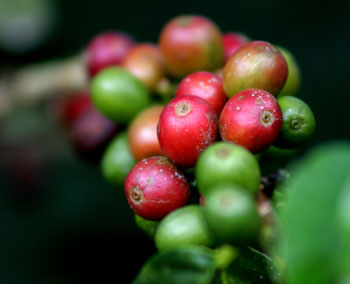With support from IICA, Mexican institutions are implementing a plan that includes plant breeding activities and efforts to enhance the technical capabilities of the country’s coffee sector.

Chiapas, Mexico, April 2013 (IICA). The Inter-American Institute for Cooperation on Agriculture (IICA) and a number of Mexican institutions are implementing actions in support of that country’s coffee farmers (Mexico is the world’s sixth largest coffee producer). The aim is to enhance the technical expertise of specialists in the detection and management of coffee rust, and to study research on varieties of coffee tolerant to the disease, such as Aztec gold.
Since September 2012, entities including the Undersecretariat for Agriculture, the National Institute for Forestry, Agricultural and Livestock Research (INIFAP), SENASICA, educational and research institutions, the AMECAFE Coffee Product System, COFUPRO-Fundaciones Produce, and the Undersecretariat for Rural Development-INCA Rural have played a key role in devising a strategic plan for monitoring and implementing measures designed to prevent and manage rust on coffee farms.
Producers are being supplied with other varieties so they can gradually replace the Arabica coffee plants used on 90% of Mexico’s coffee farms, which are susceptible to rust.
INIFAP launched Aztec gold in the 1980s, following 15 years of research; it was the first variety to be obtained in Mexico. Highly adaptable and tolerant to orange rust, the cup quality of Aztec gold is excellent, with average yields ranging from 32-45 quintales of coffee per hectare. For various economic and cultural reasons, it had not been possible to distribute it among producers until now.
In Mexico, the Chiapas, Veracruz, Puebla, and Oaxaca states produce around 90% of the country’s coffee. Chiapas is the biggest producer (around 1.8 million quintales) and the state hardest hit by the disease.
In the first of three workshops, programmed with technical personnel and organizations in the states mentioned, researchers explained that they are currently focusing their efforts on the development of institutional capabilities, plant breeding, plant health management, and post-harvest activities. The Project Coordinator of the IICA Office in Mexico, José Luis Ayala, reported that the workshop focused on the experiences of other coffee-producing countries, such as Colombia, Guatemala, and Honduras.
The participants in the activity included Misael Martínez Bolaños and Juan Francisco Caballero Pérez, researchers of the Rosario de Izapa Experimental Station, in Chiapas, which belongs to INIFAP; Daniel Domínguez and Abelardo Cisneros, consultants of the Agroinnova Chiapas Network; and staff from the IICA Office.
The specialists were agreed that certain factors had contributed to the seriousness of the situation in the region, especially the age of coffee plants, failure to pay sufficient attention to aspects such as nutrients, fertilization, pruning and shade management, climatic variability, and socio-cultural issues.
Another question that needs to be addressed in Mexico is the organization of producers. Hence, a census is being conducted to ascertain the exact number of producers, where they are located, and the surface area under cultivation.
In Chiapas, the situation is especially serious. The state is the world’s largest producer of organic coffee, a product in high demand in Europe, the United States, and Japan. If the rust is not brought under control, markets that took years to develop could be lost.
The emergency and the regional response
The high incidence of rust in Mexico, Central America, and the Caribbean, increased by climatic variability in 2012, led the Heads of State to call for urgent action to support producers in the region. Failure to tackle the situation would result in declining production levels and coffee quality in the short and medium terms, the loss of jobs and income, and reduced supplies of resources that are essential for the countries’ nutrition and food security.
Following the summit of the Central American Integration System (SICA), held in Costa Rica in February, the leaders asked the Central American Agricultural Council (CAC) to pool efforts with international organizations to formulate an integrated rust control and eradication program.
IICA, the Regional Cooperative Program for the Technological Development and Modernization of Coffee Cultivation (PROMECAFE), and other entities drafted the proposal (which was approved by the CAC ministers in David, Panama, last week). The plan calls for the implementation of integrated rust management initiatives, the development of institutional capabilities to combat the disease, the promotion of plant breeding in coffee, and assistance for the population at risk.
The Institute also produced radio messages on key aspects of efforts to combat the disease: manifestations of the fungus on plants, the steps that producers can take to prepare for the rainy season, the correct way to apply fungicides, and why it is advisable to prune plants. Also emphasized is the importance of good agricultural practices to ensure the health of coffee farms.
For more information, contact:
victor.delangel@iica.int











